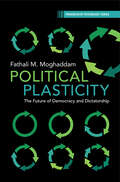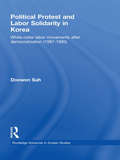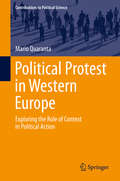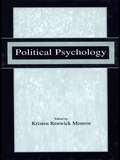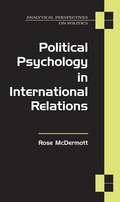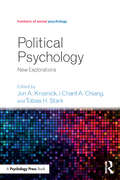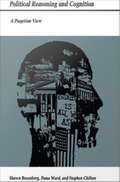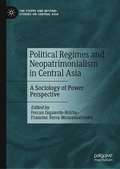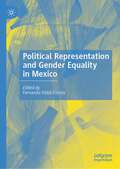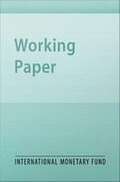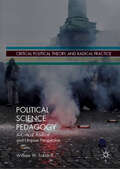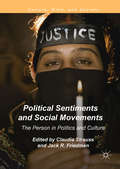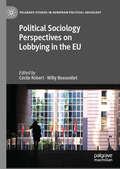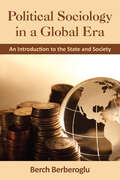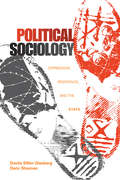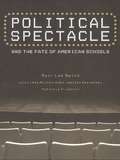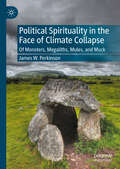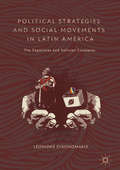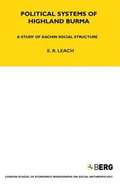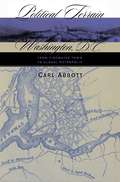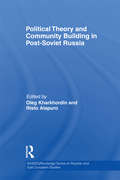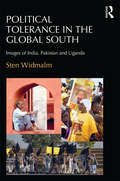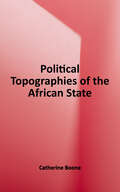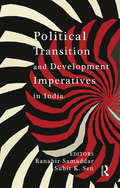- Table View
- List View
Political Plasticity: The Future of Democracy and Dictatorship (Progressive Psychology)
by Fathali M. MoghaddamPolitical plasticity refers to limitations on how fast, how much, and in what ways political behavior does (or does not) change. In a number of important areas of behavior, such as leader-follower relations, ethnicity, religion, and the rich-poor divide, there has been long-term continuity of human behavior. These continuities are little impacted by factors assumed to bring about change such as electronic technologies, major wars, globalization, and revolutions. In addition to such areas of low political plasticity, areas of high political plasticity are considered. For example, women in education is discussed to illustrate how rapid societal change can be achieved. This book explains the psychological and social mechanisms that limit political plasticity, and shape the possibility of changes in both democratic and dictatorial countries. Students, teachers, and anyone interested in political behavior and social psychology will benefit from this volume.
Political Protest and Labor Solidarity in Korea: White-Collar Labor Movements after Democratization (1987-1995) (Routledge Advances in Korean Studies)
by Doowon SuhEast Asia has undergone an intense period of economic development and accompanying social change in recent years and among the unforeseen social phenomena that have emerged are new forms of trade unions. This book analyzes the importance of such a new union movement in Korea by focusing on the promotion of social reforms by, and the intensification of interunion solidarity between the white-collar movement factions. Three sectors of the white-collar movement are examined—financial, hospital, and research unions. In comparing their success in raising social reforms and fortifying interunion solidarity, Doowon Suh considers diverse macro and micro social relations, such as the structure of political opportunities, organization leadership, and the effects of internal labor markets. This book is an important read for those interested in industrial relations, labor history and social movements in Korea.
Political Protest in Western Europe
by Mario QuarantaThis book analyzes the individual and contextual determinants of protest politics in Western Europe. Building on different theoretical perspectives, from social movements theory to political behavior approaches, the author provides new empirical evidence on the patterns of protest politics. Readers will discover why some citizens are more likely to get involved in protests than others, and why levels of protest differ from country to country. The author illustrates that engagement in political protest is often rooted in the interplay of the protester's individual characteristics and their home country's contextual characteristics.
Political Psychology
by Cristian TileagThis book provides an introduction to political psychology through a focus on European politics and topics. It describes a style of doing political psychology in Europe that has developed out of dialogue with as well as critique of North American approaches. By emphasising the theoretical and methodological diversity of political psychology, the book is intended to contribute to a greater understanding of the strength and utility of the field. - Opens up and extends the study of political psychology to a variety of socio-political contexts and manifestations of political behaviour - Clearly outlines the usefulness and promises of distinctive critical approaches in social and political psychology - Explicitly considers the role of language, communication, identity and social representations in the construction of political meanings. Political Psychology will appeal to upper-level students and scholars who seek to extend their knowledge of the complex relationship between psychology, politics and society.
Political Psychology
by Kristen Renwick MonroeWith a list of contributors that reads like a "Who's Who" of political psychology, this comprehensive volume introduces the major concepts, debates, and themes in the field and provides an overview of its intellectual development, its disparate parts, the major controversies and some suggestions for the future direction of the field.
Political Psychology in International Relations
by Rose McdermottA comprehensive account of the field of political psychology with a focus on its implications for international relations
Political Psychology: New Explorations (Frontiers of Social Psychology)
by Jon A. Krosnick, I-Chant A. Chiang, and Tobias H. StarkIn recent decades, research in political psychology has illuminated the psychological processes underlying important political action, both by ordinary citizens and by political leaders. As the world has become increasingly engaged in thinking about politics, this volume reflects exciting new work by political psychologists to understand the psychological processes underlying Americans’ political thinking and action. In 13 chapters, world-class scholars present new in-depth work exploring public opinion, social movements, attitudes toward affirmative action, the behavior of political leaders, the impact of the 9/11 attacks, and scientists’ statements about global warming and gasoline prices. Also included are studies of attitude strength that compare the causes and consequences of various strength-related constructs. This volume will appeal to a wide range of researchers and students in political psychology and political science, and may be used as a text in upper-level courses requiring a scholarly and contemporary review of major issues in the field.
Political Reasoning and Cognition
by Shawn W. Rosenberg Dana Ward Stephen ChiltonThis work presents a new, alternative approach to studying the formation of political ideologies and attitudes, addressing a concern in political science that research in this area is at a crossroads. The authors provide an epistemologically grounded critique on the literature of belief systems, explaining why traditional approaches have reached the limits of usefulness. Following the lead of such continental theorists such as Jurgen Habermas and Anthony Giddens, who stress the importance of Jean Piaget to the development of a strong theoretical perspective in political psychology, the authors develop a different epistemology, theory,and research strategy based on Piaget, then apply it in two emperical studies of belief systems, and finally present a third theoretical study of political culture and political development.
Political Regimes and Neopatrimonialism in Central Asia: A Sociology of Power Perspective (The Steppe and Beyond: Studies on Central Asia)
by Ferran Izquierdo-Brichs Francesc Serra-MassansalvadorThis book is aimed both at researchers and advanced students of Central Asia, the space of the former USSR, and the foreign policy of Russia and China. The authors adopt a sociological approach in understanding how power structures emerged in the wake of the Soviet collapse. The independencies in Central Asia did not happen as a consequence of a nationalist struggle, but because the USSR imploded. Thus, instead of the elites being replaced, the same Soviet elites who had competed for power in the previous system continued to do so in the new one, which they had to build, adapting themselves and the system to their needs. Additionally, unlike in the immense majority of the independent states that emerged from decolonization, the social movements and capacity to mobilize the people were very weak in the new Central Asian states. For this reason, the configuration of the new systems was the product of a competition for power between a very small number of elites who did not have to answer to the people and their demands. Thus, the new power regimes acquired a strong neopatrimonial component. Analyzing the structure of societies, economies and polities of post-socialist states, this book will be of great interest to scholars of Central Asia, to sociologists, and to scholars of China's rise.
Political Representation and Gender Equality in Mexico
by Fernanda Vidal-CorreaThe field of gender and politics has continuously grown, becoming more interdisciplinary and engaging with issues, context and people from all around the world. Because of this, new emerging approaches and studies challenge embedded notions, ideas and preconceptions of how the world is meant to be studied and understood. It is particularly true for studies on women and their engagement in political affairs. How should institutions conceptualize women in order to advance rules and mechanisms that favor women? What roles do representatives have on the making of gender equality? When women are legislating, which are the consequences of the approved legislation?
Political Science Pedagogy: A Critical, Radical and Utopian Perspective (Critical Political Theory and Radical Practice)
by William W. SokoloffThe field of political science has not given sufficient attention to pedagogy. This book outlines why this is a problem and promotes a more reflective and self-critical form of political science pedagogy. To this end, the author examines innovative work on radical pedagogy such as critical race theory and feminist theory as well as more traditional perspectives on political science pedagogy. Bridging the divide between this research and scholarship on both teaching and learning opens the prospect of a critical, radical and utopian form of political science pedagogy. With chapters on Socrates, Frantz Fanon, Paulo Freire, Leo Strauss, Sheldon S. Wolin, e-learning, and a prison field trip, this book outlines a new path for political science pedagogy.
Political Sentiments and Social Movements: The Person In Politics And Culture (Culture, Mind, And Society Ser.)
by Claudia Strauss Jack R. FriedmanThis unique volume is about how ordinary people construct political meanings, form political emotions and identities, and become involved in or disengaged from political contests. Drawing on psychological anthropology, it illustrates the complexities of political subjectivities through engaging personal stories that complicate our understanding of the relationship between culture and politics. Chapters examine the Tea Party and Occupy Wall Street in the United States, third gender activism in India, Rastafari in Jamaica, Courage to Refuse in Israel, the environmental movement in the U.S., Salafi movements in northern Nigeria, post-socialist labor politics in Romania, and anti-immigrant activism in Denmark.
Political Sociology Perspectives on Lobbying in the EU (Palgrave Studies in European Political Sociology)
by Cécile Robert Willy BeauvalletThis book examines lobbying in the European Union, the practices and social trajectories of interest representatives working in Brussels. Lobbying now occupies a central place in the government of the European Union and is also at the heart of European politics, as shown by the recent Qatargate scandal. The subject of lobbying has a long history in political science, and lobbying the European Union has been the subject of now classic works and specialist journals, testifying to the great success of this subject. However, most of this work have left aside the question of the professional identity, trajectories and social properties of the actors who work on a daily basis in the coproduction of European public action. Indeed, few works have been yet devoted to analysing their concrete practices. Despite the fact that over 12,000 organisations are now on the European Transparency Register, declaring increasing annual lobbying budgets, we still know very little about those who carry out this activity.
Political Sociology in a Global Era: An Introduction to the State and Society
by Berch BerberogluPolitical Sociology in a Global Era provides a critical analysis of the origins, nature, development, and transformation of the state and society historically and today, examining the class nature and social basis of politics and the state in different societal settings. The book emphasizes the centrality of class relations in explaining political power and the role of the state in class-divided societies by providing powerful theoretical and empirical analyses of themes in political sociology in an era of globalization. It examines in detail the major political issues and events of our time, and makes them relevant to the study of power and politics today. Some of the features of this text include: Introduces a global political sociology emphasizing the dynamics of power relations Provides a critical analysis of the role of politics and the state within the world-historical process Describes classical and contemporary theories of politics and the state Explains the origins and development of the state, discussing the nature of the state, its class basis, and contradictions in different types of societies Considers the dynamics of the capitalist state and traces its development in Europe and the United States from the 18th century to the present Details the role of the advanced capitalist state in the global political economy at the current, advanced stage of late capitalism Discusses the social movements that have been actively struggling against the capitalist state from earlier times to the present, including the Arab Spring, focusing on recent developments in both advanced capitalist and less-developed capitalist societies where mobilization of the masses has led to struggles against the capitalist state on a global scale Offers an original analysis of global capitalism and places it in the context of the current crisis of the global capitalist system
Political Sociology: Oppression, Resistance, and the State
by Davita Silfen Glasberg Deric ShannonA unique multidimensional view of the relationship between the state, society, and oppression Designed to help students analyze and understand political developments in the world around them, this unique text covers a wide array of political sociology concepts and theoretical perspectives. The book′s multidimensional view emphasizes the interplay between power, inequality, multiple oppressions, and the state. Blending elements of today′s prevalent power structure theories, this framework provides students with a unique focus on the structure of power and inequality in society today. This unique book traces common perspectives within political sociology. However, it adds to the existing field using an intersectional analysis by including state projects around gender, race, and sexuality. Likewise, it engages with commonly ignored perspectives within political sociology such as queer theory, anarchist theory, and post-structuralism. This gives the book a multi-dimensional view that recognizes the need to include, but move beyond, class-based understandings as well as account for the increasing popularity of anarchist, queer, and post-structuralist theories.
Political Spectacle and the Fate of American Schools (Critical Social Thought)
by Mary Lee Smith Linda Miller-Kahn Walter Heinecke Patricia F. JarvisThe authors argue that the most influential and well-known educational policy programs in the past 30 years are not based on democratic consensus, but are instead formulated by the political community as symbolic efforts meant to generate personal partisan gain.
Political Spirituality in the Face of Climate Collapse: Of Monsters, Megaliths, Mules, and Muck
by James W. PerkinsonThis book takes its motive force from our contemporary climate crisis. It seeks to reorient human (and especially Christian) understanding, towards a more ecologically-focused, indigenously-informed way-of-living. James W. Perkinson argues that our current eco-climatic and socio-political emergency is the culmination of a 5,000-year history of supremacist “settlement,” in which city-states first emergent in Mesopotamia and Egypt not only begin coercively organizing labor into surplus production and ecosystems into inordinate and destructive yields of “goods,” but in the process, also simultaneously “deform” the Spirit-World “haloing” of natural phenomenon into outsized service of imperial reach. Perkinson recognizes globalized humanity as an emerging monstrosity destroying both human culture and the world. How we re-envision and revalue, at our critical juncture, our inescapable interdependence with the more-than-human world as peer and teacher and even “elder,” is the central theme that throbs below the surface of the very disparate topics commanding attention in each chapter.
Political Strategies and Social Movements in Latin America: The Zapatistas and Bolivian Cocaleros
by Leonidas OikonomakisThis book investigates how social movements form their political strategies in their quest for social change and -when they shift from one strategy to another- why and how that happens. The author creates a model which distinguishes between two different roads to social change: one that passes through the seizure of state power and one that avoids any relationship with the state. Comparing the cases of two Latin American social movements, the Zapatistas in Mexico and the Bolivian Cocaleros, the volume argues that strategic choices are often decided upon through similar mechanisms. Ideal for a scholarly and non-specialist audience interested in Mexican and Bolivian politics, revolutions, and Latin American and social movement studies.
Political Systems of Highland Burma: A Study of Kachin Social Structure
by E. R. LeachA modern type of sociological analysis has been applied to the rich ethnographical material of northern Southeast Asia. It constitutes an outstanding development in the field of anthropological theory. (LONDON SCHOOL OF ECONOMICS MONOGRAPHS ON SOCIAL ANTHROPOLOGY: Volume 44)
Political Terrain
by Carl AbbottWashington, D.C., President John F. Kennedy once remarked, is a city of "southern efficiency and northern charm." Kennedy's quip was close to the mark. Since its creation two centuries ago, Washington has been a community with multiple personalities. Located on the regional divide between North and South, it has been a tidewater town, a southern city, a coveted prize in fighting between the states, a symbol of a reunited nation, a hub for central government, an extension of the Boston-New York megalopolis, and an international metropolis.In an exploration of the many identities Washington has taken on over time, Carl Abbott examines the ways in which the city's regional orientation and national symbolism have been interpreted by novelists and business boosters, architects and blues artists, map makers and politicians. Each generation of residents and visitors has redefined Washington, he says, but in ways that have utilized or preserved its past. The nation's capital is a city whose history lives in its neighborhoods, people, and planning, as well as in its monuments and museums.
Political Theory and Community Building in Post-Soviet Russia (BASEES/Routledge Series on Russian and East European Studies)
by Oleg Kharkhordin Risto AlapuroThis book revisits many aspects of current social science theories, such as actor-network theory and the French school of science and technology studies, to test how the theories apply in a specific situation, in this case after 1991 in the city of Cherepovets in Russia, home of Russia’s second biggest steel producer, Severstal. Using political philosophy to analyse the down-to-earth details of the real techno-scientific problems facing the world, the book examines the role of things - and urban infrastructure in particular - in political change. It considers how the city’s infrastructure, including housing, ICT networks, the provision of public utilities of all kinds, has been transformed in recent years; examines the roles of different actors including the municipal authorities, and explores citizens’ differing and sometimes contradictory images of their city. It includes a great deal of new thinking on how communities are built, how common action is initiated to provide public goods, and how the goods themselves - physical things – are a crucial driver of community action and community building, arguably more so than more abstract social and human forces.
Political Tolerance in the Global South: Images of India, Pakistan and Uganda.
by Sten WidmalmWhat makes people agree to the extension of political rights to those they clearly dislike? This book moves beyond the extensive research on this question in western contexts to focus on the global south, offering unique empirical studies of political tolerance in plural societies where poverty is prevalent and democratic institutions can often be fragile. Based on extensive data gathered in India, Pakistan and Uganda, this volume offers an account of the factors that shape the foundations of a society and its capacity to be democratic, but where the need for the protection of human rights is great and where the state is either weak or even constitutes a counter-force against the rights of individuals and groups. Combining large scale survey data with in-depth interviews in each national setting, the author exemplifies the great variation of factors which are related to political tolerance, shedding light on the fundamental patterns existing in the organisation of state-society relations and the ways in which they produce certain results owing to the manner in which the forces of modernisation operate. A broad and empirically informed study of what shapes the foundations of a democratic society in modernising nations, Political Tolerance in the Global South will appeal to scholars of sociology and political science with interests in democracy, human rights, diversity and tolerance.
Political Topographies of the African State: Territorial Authority and Institutional Choice
by Catherine BooneThis 2003 study brings Africa into the mainstream of studies of state-formation in agrarian societies. Territorial integration is the challenge: institutional linkages and political deals that bind center and periphery are the solutions. In African countries, as in territorially diverse states around the world, rulers at the center are forced to bargain with regional elites to establish stable mechanisms of rule and taxation. Variation in regional forms of social organization make for differences in the interests and political strength of regional leaders who seek to maintain or enhance their power vis-à-vis their followers and subjects, and also vis-à-vis the center. The uneven political topography of the regions ultimately produces unevenness in the patterns and depth of center-region linkage. Six sub-regions of three West African countries - Senegal, Cote d'Ivoire, and Ghana - are the backbone of the study.
Political Transition and Development Imperatives in India
by Ranabir Samaddar; Suhit K. SenThis volume explores the transition from colonial to constitutional rule in India, and the various configurations of power and legitimacies that emerged from it. It focuses on the developmental structures and paradigms that provided the circumstances for this transition, and the establishment of the post-colonial state. Different articles interrogate the idea of liberal constitutionalism, the spaces it provides for rights and claims, the assumptions it makes about citizenship and its attendant duties, and the assumptions it further makes about what it can, or has to, become in the particular situation of India. The book locates these questions in the reconfiguration of society, power, and the economy since the shift in the identity of the state after Independence, and deals with issues of constitution-making in a historical and political setting and its outcomes, especially the centrality of law and legalisms, in shaping civil society. With a companion volume on the transition to a constitutional form of governance and the consequent moulding of the citizens, this book emphasises continuity and change in the context of the movement from the colonial to the constitutional order. It will be of interest to those in politics, history, South Asian studies, policy studies, and sociology.
